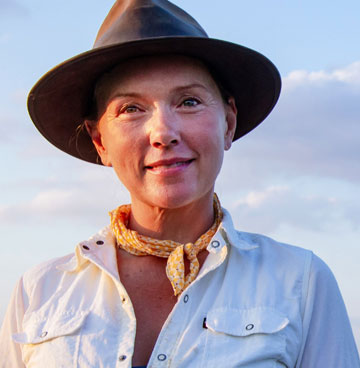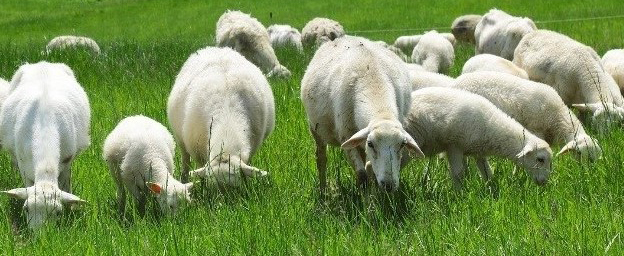MAY
Kentucky Proud Farm Bringing Lamb Baaaa-ck to the Future
By CHRIS ALDRIDGE, Kentucky Agricultural News
SHELBY COUNTY, Ky. (May 31, 2019) — In colonial America, “lamb ham” was a spring delicacy, gracing the dining tables of former presidents George Washington and Thomas Jefferson.
During the 19th century, a large influx of Scots-Irish settlers brought their sheep with them to Kentucky, where a sugar-cured, smoked hind leg of lamb became popular.
By the 20th century, particularly after World War II, pork ham, which is easier to cure and substantially larger than lamb, took the lamb ham’s place as the main course at dinners and holiday celebrations.

Now Louisville native Valerie Samutin of Freedom Run Farm in northwestern Shelby County is bringing back the lamb ham.
“That’s one of our new value-added products,” Samutin said. “It used to be very popular in Kentucky.
“[Virginians] Thomas Jefferson and George Washington used to have it every night with a glass of Kentucky bourbon, which they thought was a great complement to it.”
Freedom Run Farm was among three Kentucky Proud members that exhibited their products to a national and international audience at the 2019 American Food Fair in Chicago in May with help from the Kentucky Department of Agriculture.
Freedom Run offered samples of its Kentucky Heritage Lamb Ham, along with barbecue lamb sliders and lamb meatballs, all complemented by Mint Julep Jelly from Bourbon Barrel Foods, a Kentucky Proud company in Louisville.
Freedom Run raises Katahdin sheep, an Appalachian heritage breed. Its meat is tender, mild, and slightly sweet, lacking the gaminess typical with other breeds of lamb.
“We’re going back to the traditional ways Kentucky lamb was raised when it was the finest in the world,” Samutin said. “Prior to World War II, Kentucky lamb was revered in the finest restaurants on the Eastern seaboard. We’re bringing Kentucky lamb back to the East Coast, which is exciting.”
At the start of 1935, Kentucky had just under 1.08 million sheep and lambs, outnumbering hogs and pigs by nearly 45,000, according to the U.S. Department of Agriculture (USDA).
Samutin said a “perfect storm” of three factors helped spell the end of lamb’s pre-war dominance in Kentucky: an exodus of sheep farmers from rural areas to cities, a huge drop in wool prices after the war, and American soldiers returning home “after eating tons of mutton [while serving in western Europe] and associating that taste with a bad time in their lives.”
Kentucky’s total sheep and lamb inventory currently numbers 64,000, just 6 percent of what it was 84 years ago, according to the USDA.
“Our mission is to change that,” Samutin said. “Our program is poised to help Kentucky regain its reputation as a producer of some of the finest lamb in the world.”
Freedom Run hosted its second annual Kentucky Proud Lamb Jam in April in Louisville. The meat was showcased by chefs Ouita Michel, who runs eight central Kentucky restaurants, and Mike Wajda of Louisville’s Proof On Main.
“Chef Ouita did a presentation on lamb fries,” Samutin said. “Lexington was once the lamb fry capital of the world.”
Freedom Run also recently hosted “BaaBaaQ and Bourbon,” featuring chefs from five different Kentucky cities competing to make the best barbecue mutton in the state.
“Lamb barbecue is part of our history and something to be really proud of,” Samutin said. “We wanted to get people to taste this protein from chefs who know how to prepare it well.
“Lamb is like a little black dress – it’s so versatile,” she added. “You can dress it up with a rack of lamb, or you can go casual with lamb sliders or lamb barbecue.”
Samutin said she grew up eating lamb. Although she was born in Kentucky, her family moved away when she was 2 years old. But she developed a love for the state by returning every year to spend summers with her grandmother, who was the first cellist in the Louisville Orchestra.
Samutin founded Freedom Run Farm in 2010. After attempting to recreate a meal of roasted lamb that she enjoyed with her husband, George, on their wedding night, they were both disappointed with the quality of meat that was available.
Samutin saw a need and set out to learn everything she could about lamb shepherding. Soon, she and her husband, who both worked in the real estate business in Chicago, ditched urban life for rural Kentucky.
“We went into this hook, line, and sinker,” Samutin said. “My husband sold his sports car to buy a tractor, and my daughter started raising chickens.
“It’s not been easy, but the future has a lot of promise. This is just the beginning.”
Freedom Run Farm raises about 100 head of sheep. To keep up with demand, Samutin formed a consortium of shepherds from seven Kentucky counties who partner to bring their lamb to market under one brand.
Freedom Run lamb is distributed in Kentucky, Indiana, Ohio, Tennessee, and “we’re beginning to reach North Carolina,” Samutin said. Consumers and chefs can also purchase cuts online. Go to FreedomRunFarm.org.
“Lamb is a protein that’s very good for you, and it’s an animal that’s incredibly healthy for the environment,” Samutin said. “If you take care of these animals, they’ll take care of you a hundredfold. And I don’t think there’s a more beautiful sight on pastures, other than horses, than a flock of sheep.”

Top: Valerie Samutin. (Photo courtesy of JessFromKentucky.com)
Above: Freedom Run raises about 100 head of Katahdin sheep, whose meat is tender, mild, and slightly sweet, lacking the gaminess typical with other breeds of lamb. (Photo courtesy of Freedom Run Farm)

